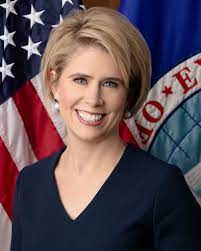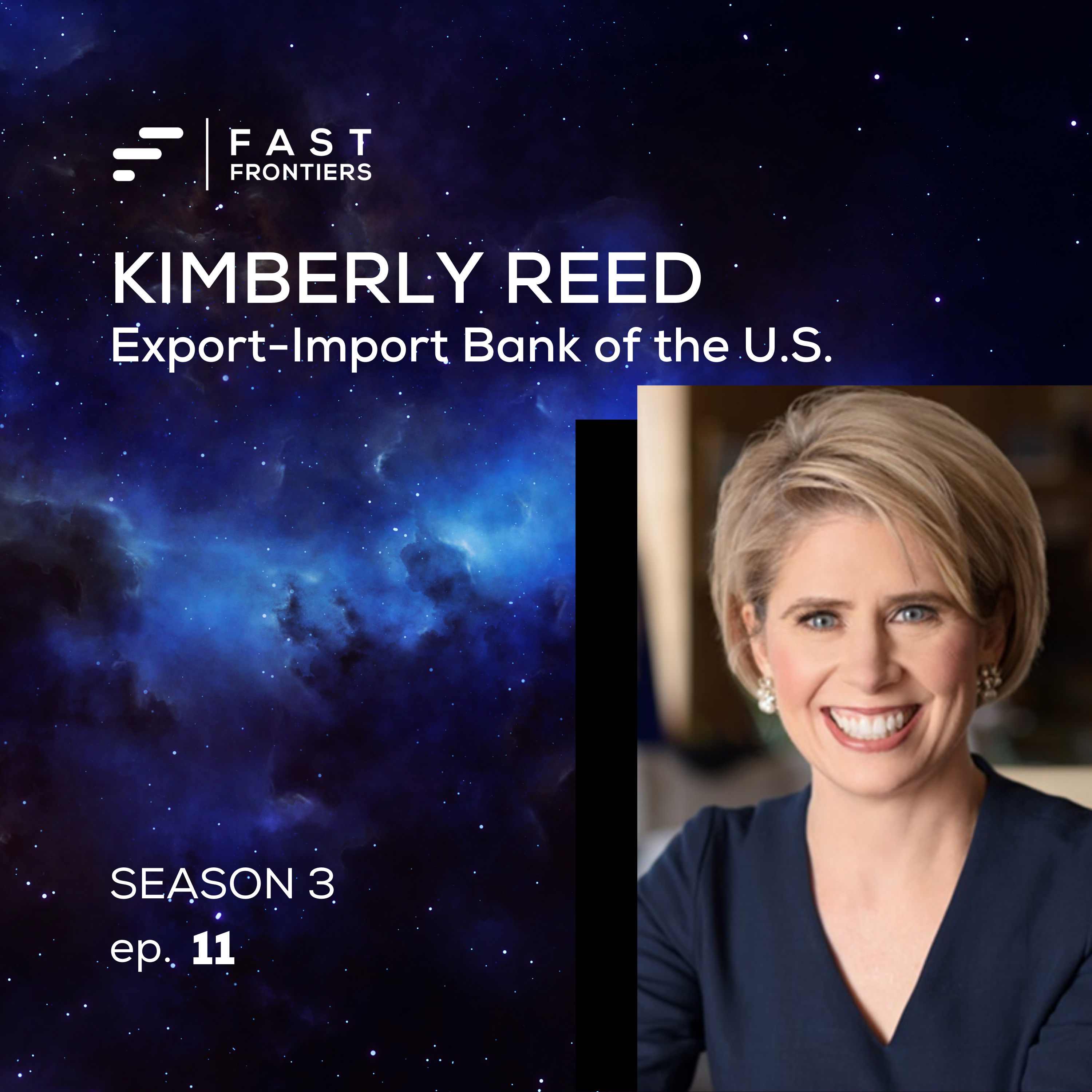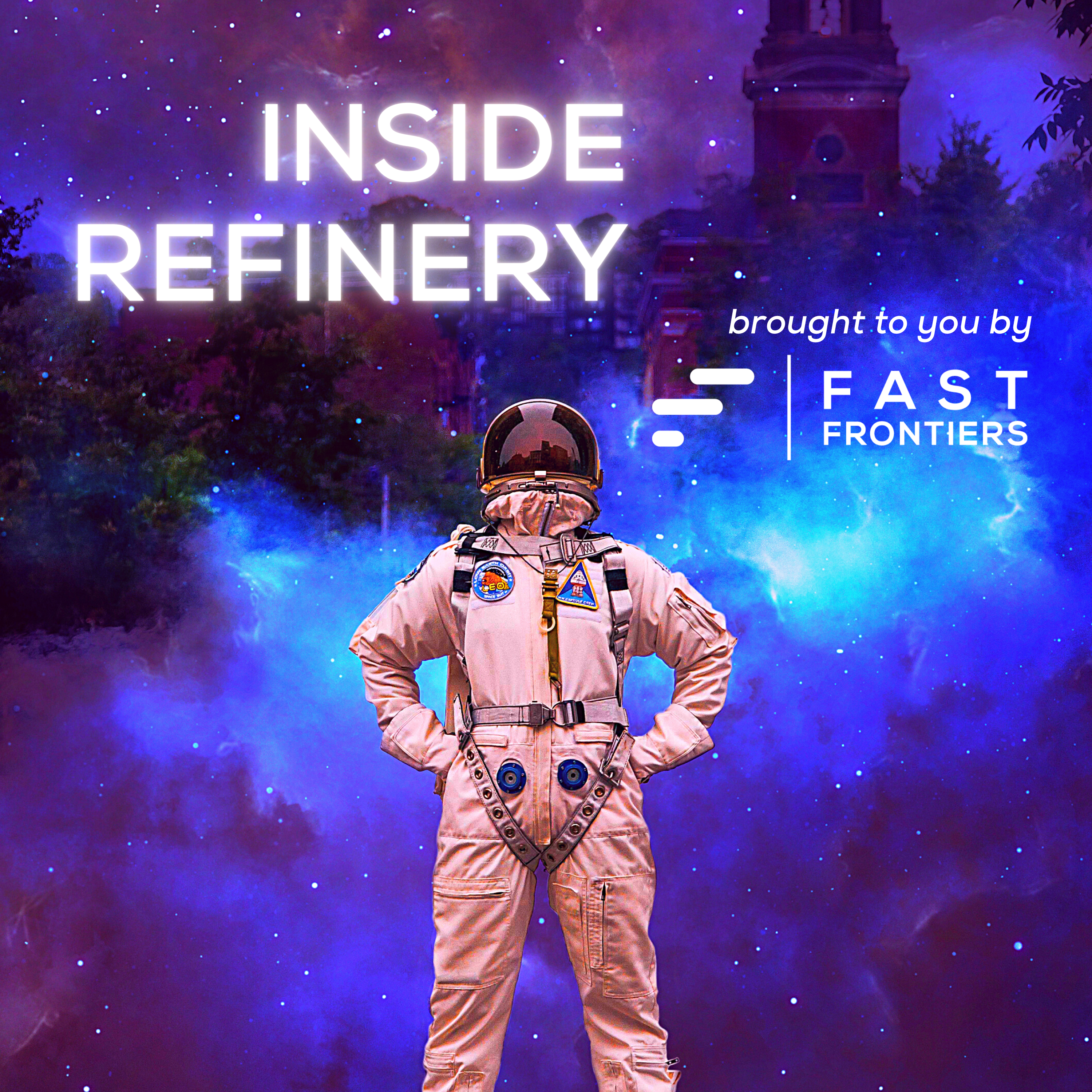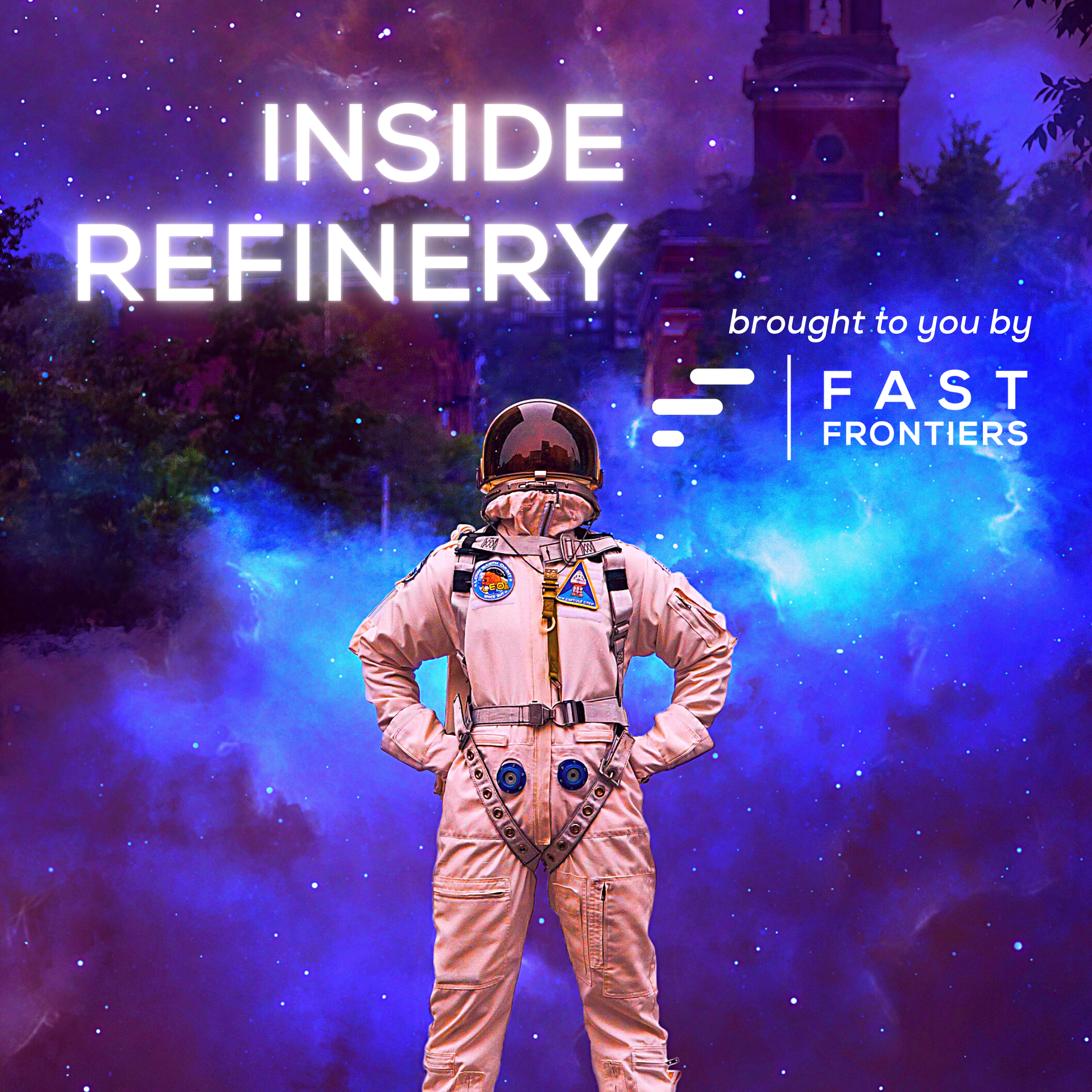S3 Ep 11. Kimberly Reed: Export-Import Bank of the U.S.
- 0.5
- 1
- 1.25
- 1.5
- 1.75
- 2
Tim Schigel : Welcome to Fast Frontiers. I am your host, Tim Schigel, managing partner of Refinery Ventures. And today, we're talking with Kimberly Reed, the former chairman of the board of directors, president, and CEO of the Export-Import Bank of the United States. The Export-Import Bank of the United States is the official export credit agency of the United States federal government, with a focus on assisting small businesses and supporting American jobs by facilitating the export of US goods and services. In today's episode, we're going to talk about Kimberly's roots and values that were formed while growing up in West Virginia, where she learned the importance of reaching out, taking a risk, picking up the phone. You just never know who may have an impact on your life. We get a masterclass on understanding how the Export-Import Bank works, its purpose, and how small businesses and startups can utilize these resources. The biggest theme or so what, I hope you take away from this conversation is how Kimberly formed her work ethic and the advice she shares with others. In particular, I love how she talks about having self-awareness and how it's important for a leader to know how your team views you and how you can make yourself better. Please enjoy my conversation with Kimberly Reed. Kimberly, welcome to Fast Frontiers. It's so nice to have you here this morning.
Kimberly Reed: I'm so excited to join you, Tim, and it's so exciting to celebrate America's business success.
Tim Schigel: Awesome. Well, you have so much to share, and I'm looking forward to it and I hope our entrepreneurs are going to get some great takeaways from our conversation here today(here). Speaking of pioneers and the Fast Frontier and innovation that's accelerating in unexpected places, one of the least expected places might be the government, so that's interesting. But you've been a pioneer in your own right over the years in terms of your leadership. We'd love to just have you share in your own words, how you see your career journey, some of those frontiers that you've explored and traveled through.
Kimberly Reed: Absolutely. And I have to smile, Tim, because when we were talking previously, you know that my mother's family is from Marietta, Ohio. For those listening who want a new book to read, I really recommend David McCullough's Pioneers. And so, it talks about the spirit. I'm half Ohioan and half West Virginian. So I'm from Buckhannon, West Virginia, and I would say that that mountaineer spirit and the values that West Virginians hold true really gave me a great foundation and a great background to now be where I am today.
Tim Schigel: That is awesome.
Kimberly Reed: So grew up in West Virginia, have a law degree, pre-med, worked on Capitol Hill for seven years, doing oversight and investigations, which is very important for any company to be aware of, Congress is always looking, served at the treasury department, senior advisor to two CEOs, John Snow, who is CEO of CSX railroad, and Hank Paulson, who was CEO of Goldman Sachs. Before leaving treasury, and this was in the Bush administration, I wanted to get line management experience. So I did something that's very important to the middle part of our country, and that was, I headed something called the Community Development Financial Institutions Fund. And so, those of you who are looking for opportunities in poor parts of our country today, I would point you to that, the CDFI Fund, and especially, New Markets Tax Credit Program that they offer, that really incentivizes capital into rural America, as well as other distressed communities across the country. I worked briefly in New York and headed also, a organization that dealt with food and agriculture issues for about seven years, not only focused on helping companies thrive globally, but also communicating the science on food safety, nutrition, and health. So I believe that as a good leader, not only do you need the substance, but you need to be a good communicator as well, and I think that's something that all leaders should strive to do. How do we improve what we do, and how do we share that message with our stakeholders? And then, back in 2017, I was asked to go join the administration, and joined an organization called the Export-Import Bank. And that took two and a half years to get confirmed by the Senate, but I was confirmed 79 to 17, which is outstanding for any nominee. We can talk about that at some point, but I was so honored to lead an institution as its first woman chairman of the board, president, and CEO, 87-year-old institution that is our nation's official export credit agency.
Tim Schigel: Wow, so you have been involved in a lot of areas that interconnect between policy and our government, then innovation and industry, and appreciate all of the assets that we do have across the country and in the middle of the country, which is just terrific. From a leadership standpoint, what lessons would you say, if you were passing down to any other young ladies that aspire to achieve the leadership positions that you have? What lessons would you share with them?
Kimberly Reed: I would say, work hard, know your substance, and as you're growing in an organization or company, it's not about you, it's about the organization and the bottom line. So you need to take the approach, I think, is looking at your leadership and saying, what do I have to offer to help this organization be more successful, and take it out of being about you, which I know a lot of millennials are said to be focused on them. It is how your skills take an organization or a company to a new level. And work hard. I sat in a chair for hours and hours and hours in my 20s and 30s. And I would also say, find great mentors and sponsors, as we call them, people who believe in you, want to be invested in you, and teach you those skills. And have self-awareness. A lot of management tools now involve something called a 360 review, and that might be hard for a lot of executives to have, but it's important to know how your team views you as a leader and what you can do to be better. And constantly get training and build that awareness on best practices. And you've got to keep attuned to what's happening, not only within your organization but within competing organizations and sectors because if you don't keep up, you're going to lose the talent. So you can start learning those skills as a young person, whether you're in a 4-H club... I was in 4-H and that taught me a lot from fourth grade, doing public speaking and demonstration contests, where you present a topic and you're judged on it, and then you hopefully bring it to scale someday, just like you're doing, Tim.
Tim Schigel: Yeah, so was there anyone in your family that had any kind of relevant experience to what... your path and some of the roles that you've had in your career?
Kimberly Reed: I would say my grandmother. My mother died when I was nine, and so my grandmother, Mommers, really stepped in and was my force. And she did not have a college degree, she was not a successful business person, but what was she? She was a hard worker and she saw where I needed to improve myself because I was a very shy fourth-grader after my mother died, and she didn't even give me a choice. She put me right into 4-H and she made sure that I was involved in activities that developed the skills where I needed to be strengthened. So I would say that. Also, my father. He's a lawyer in a small town in Buckhannon. And kids are always watching what their parents are doing, and when I was growing up, no way I wanted to be a lawyer. What was that all about? Boring, briefs. I didn't want to be in briefs. But he had on the Sunday morning news shows and that would be going on. He would have the news on. This is the '70s when we only had three channels plus, but he'd always have the Sunday news shows on, newspapers in our house. And I'm like, "Ugh, what is this? I want to play." But it sinks in. Kids always reject, I think, what their parents want to do, and they need to figure it out for themselves. So by the time it came time for me in undergrad to take the MCAT and go to med school, I'm like, "Who am I, and what do I love?" And it was public policy, and then all those things that my father exposed me to. So it's important to expose your kids to things, so I think he takes great pride. Now, I was just back in Morgantown, West Virginia last week, and I was given an award by West Virginia Executive Magazine, lawyer and leader award, and this last week was the big... Well, it was supposed to happen in 2020 and they had to postpone because of COVID. But I think my dad was very proud of me and I was very proud of him, but I was also very proud of future leaders that I invited here at the law school, who I really believe in mentoring them. So those are a few people, and then a couple of teachers. One was an undergrad professor named Robert Rupp, and you can still hear him on National Public Radio, occasionally. When I was at West Virginia Wesleyan College Pre-med, Wesleyan made its... Wesleyan had its students take something called J term where you would take one course for three weeks. And the beauty of a small liberal arts college, which is what I needed at age 18, was that you have to take a wide swathe of classes. And so, I signed up for my history and government credits and took this course called JFK, 1960, and the West Virginia primary, and this new professor at Wesleyan wanted to share his interest in this very important election. Kennedy was a Catholic, and back in 1960, that was a big deal to getting elected. And protestant West Virginia, he needed to win that to show the world, or the country, that he could be president, and so he went about doing that. And Dr. Rupp taught this course, I learned a lot, and then Dr. Rupp had each of us write a paper. And he looked at me and he said, "You need to go interview someone who was active in 1960 in the campaign or the West Virginia politics." He's like, "You need to go interview the sitting secretary of state, Ken Hechler," And I'm like, "What?" And he's like, "Yes, go interview him. That would be a great thing for your paper," and I'm like, freshmen in college. How do you -
Tim Schigel: Why is this person going to talk to me? Okay.
Kimberly Reed: And this is before the internet, so I got out the phone book, probably was inaudible the state capital's phone book, figured out how to call the secretary of state. What? And I called, I asked for appointment, I got it, and the next thing I know, I'm seated in the beautiful Capitol West Virginia, which has a gold dome, and Ken Hechler is telling me everything and I'm taking down notes. What did that teach me? It taught me to show up and ask big, and I couldn't believe I did this. And so, Dr. Rupp was a big inspiration. A few years later, I was getting ready to go to law school, and I read in the local paper that there was this big national conference taking place two hours away from me in our state capital, and it was going to have a lot of young leaders. I wonder what that's like. Dr. Rupp would tell me to go down there, so I just got in my car and drove down to the Charleston Marriott, bought a ticket, and went to this national conference that I was not invited to, and my world changed. There was a keynote speaker, and he had a bevy of white hair, and he got up on stage and gave a speech about welcoming everyone to West Virginia. Given the history of West Virginia, the speech was entitled, It's a thing called character, Lincoln had it. And he went through how West Virginia is the child of the Civil War, the values that Lincoln had, the values that West Virginians have, and I was smitten by this speech, mesmerized. And what do you know? That was in June of 1993. In September of '93, I go to law school and I'm seated in my contracts class, and in walks this man with bright, white hair, the same man, Professor Thor Spelman. So I got to honor him last week, nearly 30 years later, at this award ceremony. But those were some big influences in my life.
Tim Schigel: That is incredible. You just shared a whole truck full of nuggets that I love, but this last one about just asking and showing up, whenever I get a chance when young folks ask me, that's one of the things I stress, that's always served me well, you just pick up the phone, right, call, reach out. And it's amazing how many people respond to that, because they've been in those same shoes, right, and they're going to return the favor. It's amazing to see and hear how it's affected your career by just that little act.
Kimberly Reed: And I would say, as I counsel a lot of young people and former employees, you got to get yourself out there because the people you expect to help you the most don't, and the person you hardly know is going to give you your next job and change your life, find that type of person that has that approach to life. And I would say to all the leaders that are listening, help everyone you can, make a difference in their lives. Don't make it be about yourself, because your trajectory won't go as far, because someday, one of those people may hire you. And everyone's always looking and paying attention. Think back when you were a little kid. Kids are looking at you and they're learning from example. Even at age four and five, they're watching, and that's-
Tim Schigel: Even the little things, not the big thing, even the little things. Yeah, that's awesome. How should entrepreneurs think about and relate to things like the Ex-Im Bank? Or you're involved with the counsel and competitiveness, and just their role, and the role of government, and what they do, particularly in this economy that, as most entrepreneurs know, is global, right?
Kimberly Reed: Absolutely. 95% of the United States customers are outside of our borders. And it's very daunting, I'm sure, starting from scratch. I have a young sister, aged 31, who just opened a small gift store in Fayetteville, North Carolina, this weekend. I was there for the grand opening. That is daunting, to rent the place, get the furniture, get the inventory, pay for it all, hope-
Tim Schigel: Hope people show up.
Kimberly Reed: I really admire the grit of people who do that. And you're going to be successful, and sometimes you're going to fail, but every failure also has its great lessons, and I know she's going to be a success. But if you're an entrepreneur and you want to access the global marketplace, I would say, read a lot and look and see the success stories that have happened before you, and what were their trajectories? And use that to inform you. And so, with the Export-Import Bank, it is a big institution, 87-year-old institution known as our nation's official export credit agency. It can support financing at any one time on its books of $135 billion. And so, we'll just briefly touch on the big thing it does. We're talking about big companies, foreign purchasers around the world. They want to buy American- made products, or maybe they want to buy Chinese products or German products. They're going to look for quality, reliability, but they're also going to look for financing, perhaps. And so, in our world, there are some markets that are going to grow. We know the continent of Africa is going to grow. We know that India is going to grow. Just look at the population demographics, and where do you want to be involved? And so, let's say you make a widget. What kind of widgets have you supported in your career?
Tim Schigel: Well, I buy a lot of widgets. I'm a gadget guy. But most of the companies we invest in are software- oriented.
Kimberly Reed: Okay, so goods and services. So let's say you're a software company and you want to sell a product. Okay, so you want to sell your software in Senegal, and it's really expensive and the buyer maybe has some issues. And so, they need a loan, and maybe the big banks say, "We're overextended in this country. This country is too risky for us." Whatever the issue may be, that foreign purchaser can come to the Export- Import Bank for a direct loan to buy that made-in-USA good or service. And so, it goes through a lot of due diligence, extreme underwriting. Ex-Im has an excellent default rate, excellent. Right now, when I left Ex-Im on January 20th, it was up a little bit because of COVID, 0.7%. But the whole time I was there before COVID, always under 0.5%, which you ask any financial institution, that is the envy of them. They know that is outstanding because we protect the taxpayer. It's the tax payer that's on the line, and the full faith and credit of the United States is backing the loan. So Ex-Im will do due diligence, will present to the board, I was chairman of the board, any deal over $25 million. Smaller deals just go through delegated authority process at the staff level. But we make the direct loan, and then have the terms and what not to get repaid. But the mission is supporting US jobs, or I would say, supporting American jobs by facilitating US export. So direct loans. Also, bank may want to give the loan, but they need a guarantee, and so a second product that Ex-Im does is guarantee of the loan that the private sector, financial institution, may be offering a foreign purchaser. We also do something important in the time of COVID, so supply chain financing guarantee, working capital loan guarantee. Again, working with the financial institution to help companies in the United States be successful. And then, for those small companies really starting out, and I met a lot of them during my tenure, including in Ohio, export credit insurance, so I think that is something really important for small businesses. You want to send your widget to Senegal. You can apply for an insurance product from us to make you hope if the buyer doesn't honor the deal. And I celebrated that throughout the country. An example of that might be, I was dealing in Florida and there was a towel company. They're sending their towels to resorts around the world, and so they use export credit insurance. But many, many, many different examples, and happy to tell you where you can find examples of that. But one would be, last day at Ex-Im, we published our annual 2020 report, but it's entitled All America, Ex-Im supports American jobs, but it basically goes through all of what the agency does and gives you a lot of good examples, because we awarded Exporters of the Year who used our various products and services. And so, you can also read about a couple of Ohio companies, including Consolidated Metal Products and Robbins Sports Surfaces, that makes basketball courts in Cincinnati, but they're sent to 70 countries. And also, our new Broker of the Year that we gave an award to, JZJ Insurance Services, based out of Columbus. They also are very involved with what Ex-Im does, headquartered in Columbus, and focused in on that great credit and political risk insurance. So those are important products to companies that I'm sure you are helping with your efforts as well.
Tim Schigel: Yeah, it's important to be aware of all those resources available as you're a growing company. What trends have you seen from that vantage point within the technology industry?
Kimberly Reed: At Ex-Im, we were essentially shut down for four years. I'm going to say that the world knows what export credit agencies are now, and there's 116 of them. And China has two official export credit agencies, several unofficial methods, but every country has this now. And the United States and our Congress make sure that our Ex-Im is of the highest standard, and we've got rules in the Congress that senators are very smart on. And so, a few senators, free market, Libertarian, Republican, small swathe, don't think it's the role of government to do what we did and do at Ex-Im. And so, they basically blocked the nominees to the board, because the bylaws say, you need to... or a charter says, you need a board to do deals over $25 million. So they sat on nominations and blocked to keep the agency shut for four years, and so I gave two and a half years of my life to get through the Senate confirmation process and build understanding, and also pledged to transform the agency. And as part of that, after I finally was confirmed and worked on transforming the agency, Congress had to do a reauthorization of our agency, and so opened up a bank, got it going again, trying to get customers to be focused on our products and learn about us, and then had to go through reauthorization. As part of that reauthorization process, Congress focused in on something very important, which was looking at the future, and where are we headed or where should we be headed? And so, they reauthorized us for the longest tenure in the history of the bank, seven years, so happy to get it there. But also, they said, "We want you to advance America's comparative leadership in the world, and we want you to focus in on 10 transformational export sectors, and we are going to give you the legislation. We want you to do this so much with these companies in the United States, that we're going to give you legislation that allows these sectors to match the rates, terms, and conditions, and the competitive global marketplace at the People's Republic of China, maybe offering the foreign purchaser, and so you get special ability to do that." SO I see these as the trends, these sectors, artificial intelligence, biotechnology, and I come from the world of food and ag, so I also see that as food and ag biotech, biomedical sciences, which we know is very important, obviously, as we get through COVID and we see the importance of research, wireless communications, including 5G, quantum computing, renewable energy, energy efficiency, and energy storage, semi-conductors, and semi-conductor machinery, emerging FinTech. And that is a full cloth of that from tracking terrorist financing attempts to helping-
Tim Schigel: That would include crypto?
Kimberly Reed: Yeah, yeah. So FinTech, Congress did not define it. They just said that word. So I would say, If you're a crypto company, you make an application, it's judged on its merits, you work with the staff, and we'll see whether they feel that you have reasonable assurance repayment of the financial products that you might be seeking. Water treatment and sanitation. I mentioned renewable energy, so that is a really big thing, I think, right now, underscored by President Biden, and then finally, high-performance computing. So I'd be interested in hearing where you're focused on this -
Tim Schigel: Sounds like technology is dominating that top 10 list.
Kimberly Reed: So that's where I see the trends. I just did an event a couple weeks ago with Peter Thiel, and he is, obviously, we know, co-founder of PayPal and some other important companies and efforts, and he is a free-market libertarian. And you can listen to the clip. Nixon Foundation is doing this thing called The Nixon Seminar, where there's a discussion once a month on a topic important to America's national security and prosperity. And so, Peter Thiel, I asked him, "How else could US Government be working with Silicon Valley to make a difference for our country?" And I'd never met him before, never had a conversation with him before, and he immediately, free-market libertarian, said, "Free-market libertarians probably oppose Ex-Im, but I don't think that is very smart, and we need more of it." So you can read the statement, so even someone like him realizes there's a role for government and agencies like Ex-Im.
Tim Schigel: Yeah, and making sure we're playing on a level playing field, globally, is hugely important, particularly since the global market is just a bigger opportunity for every single company. If you're not thinking globally, then the odds are you may not end up being a market leader. So Kimberly, what would you recommend entrepreneurs do to better educate themselves on the opportunities and how they might think about how Ex-Im Bank or the role of government should play in their business and growth?
Kimberly Reed: I think, just sitting in the seat of someone in a small town in rural West Virginia, what would I do? As I traveled the United States in person and virtually, I did a lot with regional trade centers, the Department of Commerce, small business administration, Ex-Im. A lot of different government agencies are regularly presenting to these trade centers, so go find one. We were a staff of 515, and we had eight regional offices. You can find them on Ex-Im's website. So if you're really needing help getting plugged in, I would say, look up that part on the website and find one of the staff and say, "How do I plug in fully to opportunities from the government?" And they could probably point you, I would assume, to where they're regularly engaged, but even more than Ex-Im, because that's just a very fine tool. The commerce department and SBA and others also are co-located at centers throughout the United States, so it's pretty easy for you to figure that out if you do some searching on the web. And so, that would probably be my first step, your regional trade centers, and then these government hubs, because even if you're rural America, the Department of Agriculture, for example, has regional offices. And I would say, call your Member of Congress. I worked on Capitol Hill for seven years, as I mentioned, and this is the job of their staff, is to help you learn and navigate. And they might not have all the answers, but they have the ability to look, and they should know district offices, state offices, constituent services. They should also plug you into the opportunities that they know about. And our country is continually changing and new things come online. You might be involved in some trade associations. Sometimes, that has a dollar amount I know that's associated with it. So if you're small, that might be daunting, but some of the small business organizations, I was committed to small business, Ex-Im, 90% of what we did was small business deals, small all the time, but then you have one big widget that you're financing that can offset lots of small ones. But I think some of these small business trade associations, look on their websites, go to some conferences, network, word of mouth, keep smart, read. But those are just some initial steps I would do.
Tim Schigel: Yeah, it goes back to what you said at the very beginning, show up, just call, call your Congressman, ask for some help, don't be afraid to ask. That's terrific. First of all, thank you very much. I think for anybody who's... if they're intimidated, the big, baseless government, will they help or not, by getting to know you, and understanding where your passion is and your commitment to helping entrepreneurs and personalization in the US, hopefully, this will help bring down some walls and encourage people to reach out and learn more and see how they can grow their businesses. So thank you very much, Kimberly.
Kimberly Reed: And thank you for what you're doing, because capital is what makes success happen, right? And it's really important that we have great people like you caring so much, and thank you for being dedicated to those small businesses and people with big dreams, because some of those big dreams are going to go into big reality. And I hope in the years to come, you can celebrate US job creation in every corner of our country that you've helped make possible.
Tim Schigel: Amen to that. Thank you. That's terrific.
Kimberly Reed: Thank you. Have a great day.
Tim Schigel: Thanks.
Kimberly Reed: Take care. Bye-bye.
Tim Schigel: Thanks for listening to Fast Frontiers. If you like our show and want to know more, check out our website, fastfrontiers.com. If you enjoyed this episode, please share it with others, and give us a rating and review on your favorite podcast platform. Join us next week when we bring you the final conversation of season three, with Alex Frommeyer, co-founder and CEO of Beam Dental in Columbus, Ohio. The Fast Frontiers podcast is brought to you by Refinery Ventures. Our producer is Abby Fittes. Audio engineering by Astronomic Audio. Marketing, content, and social media support from Content Callout, and our podcast platform is Casted.
DESCRIPTION
Today we're talking with Kimberly Reed, the former chairman of the board of directors, president, and CEO of the Export-Import Bank of the United States. We're going to talk about Kimberly's roots and values that were formed while growing up in West Virginia, where she learned the importance of reaching out, taking a risk, picking up the phone. You just never know who may have an impact on your life. We also get a masterclass on understanding how the Export-Import Bank works, its purpose, and how small businesses and startups can utilize these resources.
Today's Host

Tim Schigel
Today's Guests








